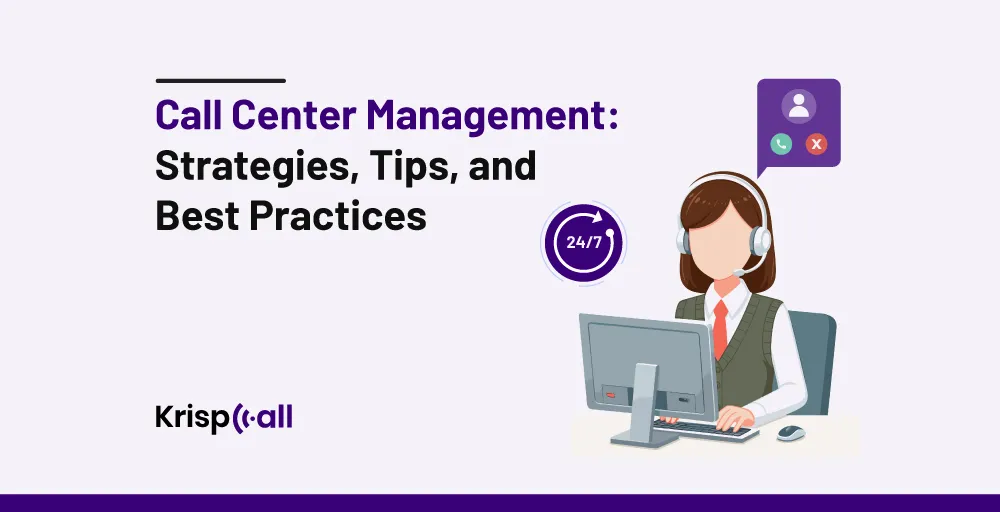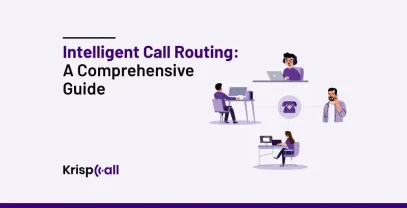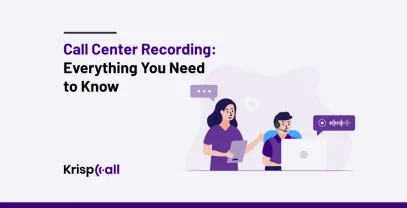Are you looking for proven strategies to optimize your call center’s performance and boost customer satisfaction?😊
Effective call center management is not just about handling calls. It’s about making seamless experiences, empowering agents, making data-driven decisions, and utilizing technology to drive efficiency and customer satisfaction.
In this comprehensive blog, you will learn about the meaning of call center management, key roles, areas to focus and best practices to implement for higher efficiency, lower costs, and increased customer loyalty.🌟
🗝️ Key Highlights
- Call center management is all about making sure a call center runs smoothly and handles customer interactions well.
- Key roles in call center management include the call center manager, supervisor, and agents.
- Effective contact center management focuses on staffing and training, performance management, customer experience, and technology.
- Essential practices for effective call center management include customer feedback mechanisms, call monitoring tools, omnichannel support, top talent recruitment, agent burnout prevention, and metrics tracking.
- KrispCall helps to manage call center operations with its unified communications, omnichannel support, and advanced call routing.
Let’s get started. 🚀
What is call center management?
Call center management is the process of monitoring and optimizing the daily operations of a call center or contact center to effectively and efficiently handle customer interactions.
It involves managing a team of customer service representatives (CSRs), implementing call center technologies and systems, monitoring and analyzing call center data and performance metrics, and continuously improving contact center processes. It assists in boosting customer satisfaction, agent productivity, and overall operational efficiency.

In the past, “call center management” and “contact center management” were distinct terms, but they are now interchangeable. As customers increasingly interact with businesses through digital channels like chat, email, social media, and messaging apps, companies have adopted the term “contact center” to reflect this shift toward omnichannel communication.
For example, call center management involves creating schedules for agents, monitoring their performance, and predicting the number of calls that will likely come in to ensure enough staff members work at all times for maximum efficiency. A call center manager also needs to track key center performance metrics, such as the customer satisfaction score, first call resolution, and average call handling time.
What are the key roles in call center management?
Call centers follow a hierarchical structure that adapts to the organization’s size. Several key roles and responsibilities are assigned to their management.
In larger call centers, a manager oversees operations, supervisors manage teams, and numerous agents or representatives handle calls. Smaller call centers, on the other hand, often skip the supervisor role and rely directly on managers and agents for streamlined operations.
Call center manager
The call center manager is the highest position in the call center management hierarchy. It plays a pivotal role in overseeing daily operations and shaping the call center’s strategic direction. The manager is also responsible for recruiting, training, and guiding call center staff.
Key responsibilities of call center manager:
- Assigning tasks and responsibilities to supervisors and agents effectively.
- Clarifying job roles and duties for all team members and leading team meetings.
- Assessing customer expectations and needs and aligning operational strategies accordingly.
- Evaluating contact center analytics to derive actionable insights and make informed decisions.
- Establishing immediate and future objectives for sales and customer support in the call center.
- Choosing suitable call center software and customer service technologies.
- Identifying key performance indicators (KPIs) to measure call center performance and achieve organizational goals.
Call center supervisor
A call center supervisor is responsible for overseeing the operations and performance of agents in a call center. They play an important role in ensuring customer satisfaction.
Supervisors work closely with managers to develop and execute management strategies and maintain regular communication with managers and agents. They are responsible for handling agent training, call monitoring, and gathering feedback for management to improve strategies and decision-making.
Key responsibilities of supervisor:
- Monitoring calls and providing real-time call center coaching to agents.
- Guiding essential call center agent training, employee hiring and onboarding process, and development.
- Handling customer support issues and challenges that agents cannot handle.
- Establishing goals, often in collaboration with senior management.
- Establishing and upholding a harmonious workplace culture.
- Conducting audits on agent performance using call recordings and transcriptions.
- Assisting in optimizing call center processes to enhance efficiency.
- Notifying management of outdated practices or areas requiring a fresh strategic approach.
Customer service representatives
A Customer Service Representative, also known as a call center agent, manages incoming and outgoing customer calls. Their responsibilities extend beyond answering queries. They are often the first point of contact for customers and represent the company’s brand and values. They play a crucial role in managing the call flow in a call center.
Key responsibilities of customer service representatives/call center agents:
- Making outbound calls and handling inbound calls in a professional manner.
- Establishing strong customer relationships.
- Gathering, documenting, validating, and refreshing customer details and additional data to effectively manage conversations.
- Recording post-call notes and utilizing a CRM platform or customer experience platform.
- Recognizing and escalating urgent issues when necessary.
- Verifying customer information and arranging appointments or follow-up calls.
Strategic focus: Areas for efficient contact center management
You should concentrate on four key areas to effectively and strategically manage a contact center.
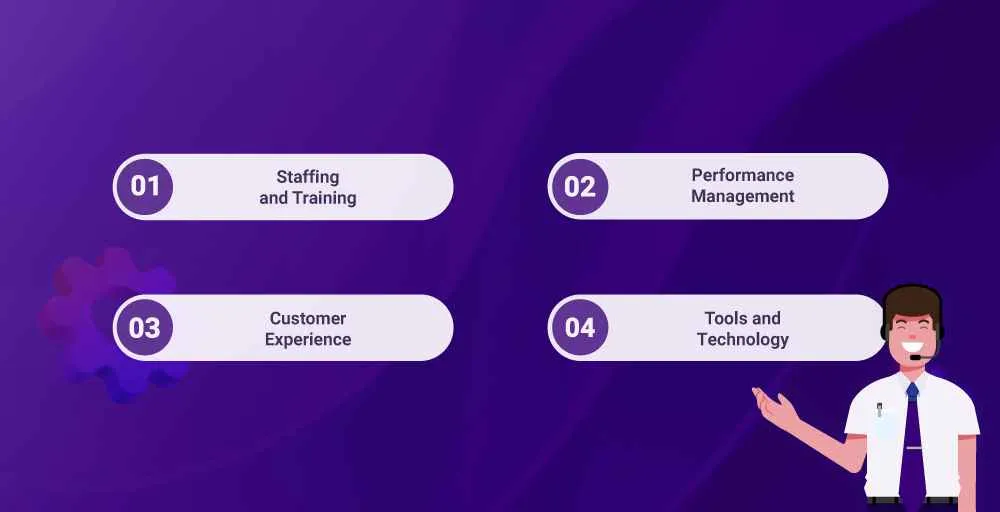
Staffing and Training
Staffing and training are important for running a contact center well. You’ve got to make sure you have enough skilled agents to handle all the customer complaints, calls, and questions effectively. It involves analyzing call volume and the types of questions customers ask to determine how many agents are needed.
Training is also a big deal. Your agents need to know everything about your products or services, be great at talking to people, solve problems well, and understand how everything works in your contact center.
You can keep investing in training and helping your agents grow. That way, they can keep up with industry trends and improve their skills. Through ongoing feedback in call center coaching, agents continuously refine their skills, leading to a more positive customer experience with every interaction.
Performance management
Effective performance management is essential in contact centers to ensure high productivity and quality service. It involves defining clear performance metrics and key performance indicators (KPIs) such as Average Handling Time (AHT), First Call Resolution (FCR), and Customer Satisfaction Scores (CSAT.
You can monitor and evaluate agent performance using tools like call monitoring. Call Center Quality assurance checks are also crucial for pinpointing areas for improvement and offering timely feedback and coaching to agents.
You can set achievable goals, craft improvement plans for underperforming agents, and recognize and reward top performers. It can boost motivation and drive continuous improvement among agents.
Customer experience
Customer Experience is another critical focus area for contact centers. Agents must grasp customer needs through data analysis, feedback collection, and surveys. This insight allows contact centers to anticipate expectations, proactively address pain points, and deliver personalized interactions.
It involves offering multiple engagement channels like phone, email, chat, and social media while also streamlining processes to reduce customer effort and frustration.
Tools and Technology
Effective contact center management uses advanced communication platforms like VoIP, robust CRM systems for real-time customer data access, automation, AI for handling routine tasks, and omnichannel integration for a seamless customer experience across channels. These tools and technologies streamline operations, enhance customer satisfaction, and drive business growth.
11 best practices for effective call center management
Is your company committed to providing exceptional customer service?
Here are some of the best call center management practices that can boost how you deliver customer experiences:
1. Prioritize employee engagement
Prioritizing employee engagement is crucial for effective call center management. You must keep your employees satisfied and happy to make your customers happy. When you prioritize your employees’ well-being and development, they become more focused, motivated, and capable of delivering excellent work.
This positive cycle of employee satisfaction directly impacts customer satisfaction, leading to better overall outcomes for your business.
You can increase employment engagement by
- Offer consistent constructive feedback and inquire about how you can support their goals.
- Providing training and development opportunities.
- Fostering open communication and encouraging agents to make crucial decisions.
- Promoting work-life balance and implementing recognition and rewards programs.
- Providing a collaborative work environment.
When you integrate these strategies into your employee engagement initiatives, you can cultivate a supportive and motivating workplace culture that inspires employees to achieve their best performance.
2. Provide comprehensive onboarding and training
Comprehensive onboarding and training are essential best practices for effective call center management because they set the foundation for agent success and customer satisfaction. They provide agents with in-depth knowledge about the products or services they will support. This knowledge makes agents confident and allows them to address customer inquiries and troubleshoot issues easily.
Agent training should focus on active listening, tone of voice, language proficiency, and de-escalation techniques to ensure positive customer interactions.
Platforms such as KrispCall provide call recording capabilities, which are invaluable for training and onboarding. Supervisors can utilize these recordings of actual calls to provide new hires with realistic scenarios they are likely to face.
Additional effective onboarding ideas include:
- Conducting role-playing exercises: You can have supervisors to participate in simulated calls who will portray customers.
- Facilitating shadowing opportunities: You can allow new employees to observe customer service or sales calls to gain insights.
- Hosting webinars: You can conduct onboarding sessions for multiple employees concurrently or provide on-demand video resources.
- Conducting periodic reviews: After the onboarding phase, you can collect feedback and assess team members’ progress.
Implementing comprehensive training and onboarding procedures will prepare your new agents to handle various customer calls.
3. Integrate call center technology with other tools
Integrating call center technology with other tools can significantly boost efficiency, customer experience, and overall productivity.
You can integrate call center technology with other tools in several ways:
- Customer Relationship Management (CRM) Systems: Salesforce, HubSpot, Keap, Nimble, ActiveCampaign
- Communication Platforms: Google Contacts, Teams, Zoom, Microsoft, WhatsApp
- Data and Reporting Tools: Zapier, Domo, Tableau, Pabbly Connect
- Productivity Platforms: Integrately, Slack, Google Workspace
- Sales Automation Systems: Outreach, Salesmate, Agile, Pipedrive
- Help Desk Platforms: Help ScoPlayvoxut, Intercom, Zendesk, Freshdesk
IVR systems are also crucial call center technology. They automate call routing based on customers’ voice prompts, directing calls to the appropriate support agent.
4. Have customer feedback mechanisms
Customer feedback mechanisms are crucial for call center management to continuously improve service quality and customer satisfaction.
Here are some best practices for integrating customer feedback into call center operations:
- Multiple Feedback Channels: You can use various channels for customers to provide feedback, including post-call surveys, email, online forms, social media, and dedicated feedback hotlines.
- Clear and Simple Surveys: You can design feedback surveys with clear, concise questions that are easy for customers to understand and respond to.
- Encourage Honest Feedback: You can create a culture that values honest feedback and assures customers that their opinions are valued.
- Anonymous Feedback Option: You can also offer customers the option to provide feedback anonymously, particularly for sensitive issues or concerns where anonymity may encourage candid responses. However, you must ensure that customers’ privacy will be respected and their feedback will remain confidential.
- Communication and Transparency: You can inform customers about changes or improvements in response to their feedback.
5. Use call monitoring tools
Another effective way to manage a call center is to use live call monitoring tools. These tools allow supervisors and managers to listen to live or recorded calls, assess agent performance quality, and provide valuable feedback for improvement.
Supervisors can use call monitoring as a training tool to identify areas for improvement and provide coaching to agents. It also allows supervisors to identify best practices and successful strategies used by top-performing agents. The team can share these insights to standardize best practices and improve overall performance.
KrispCall offers personalized quality call monitoring for effective coaching and performance tracking that ensures top-notch service delivery. Features like call whispering enable managers to instruct agents privately without customers overhearing, and call barging allows them to intervene in ongoing calls as needed.
6. Collaborate with your product team
Call center agents provide efficient support if they know the products very well. Well-informed agents can resolve customer issues more effectively. It is essential to establish a clear communication channel for sharing information between the call center and product teams.
The product team should provide full specifications of the product and train agents to handle frequently asked questions about the products when updated or new products come into the market. This helps to enhance customer experience and product quality.
7. Prevent agent burnout with effective scheduling
Proper scheduling in a call center is crucial for maintaining agent productivity and preventing burnout. This is especially important in smaller call centers where agents often extend their hours to handle workload.
It is essential to schedule agents strategically to prevent agent burnout. You can start by identifying peak hours and assigning experienced agents during these times. You should consider each agent’s abilities and assign tasks accordingly to optimize performance. You should also avoid back-to-back shifts and allow sufficient breaks between shifts for agents to recharge.
It is an excellent strategy to implement a fair rotation system for shifts and use solutions like call center workforce management to automate scheduling processes. You should continuously monitor and adjust schedules based on feedback and performance data to balance productivity and agent well-being.
8. Offer an omnichannel cloud contact center platform
Offering an omnichannel cloud contact center means being accessible to customers through various communication channels, such as phone calls, emails, social media platforms, live chat, and more. This approach acknowledges that customers have different preferences regarding reaching out for support or inquiries.
Omnichannel support also provides a holistic view of customer interaction that helps your team to understand customer needs and preferences better and build stronger customer relationships.
9. Recruit top talent for your team
Hiring the right employees is crucial to building a successful call center team. Your company should look for individuals who not only have technical skills but also possess a genuine passion for customer service. This enthusiasm translates into positive interactions with customers and boosts strong relationships.
During the hiring process, you can take the time to evaluate candidates not just on their qualifications but also on their alignment with your company’s values and culture. You can identify team players who demonstrate empathy, effective communication, strong problem-solving skills, and a proactive approach to resolving customer issues.
10. Track call center metrics
A call center manager is responsible for monitoring overall customer behavior and boosting the performance of the call center agents for effective call center operations. Call center metrics tracking helps in understanding performance, identifying areas for improvement, and making data-driven decisions.
Call center managers gain insights into operational efficiency and customer experience by defining key metrics such as average handling time (AHT), first call resolution (FCR) rate, customer satisfaction (CSAT) scores, net promoter score (NPS), and agent utilization.
11. Develop call center standard operating procedures
It is crucial to develop call center Standard Operating Procedures (SOPs) to manage call centers effectively. SOPs are documented guidelines that outline the steps and protocols agents should follow in various scenarios to perform the organization’s day-to-day operations.
Call center SOPs should cover HR policies like attendance and time off, software user guides for tools training, and KPIs for call resolution time and etiquette standards. It ensures consistency, efficiency, and quality in customer interactions.
KrispCall: The best call center management software for businesses
KrispCall is robust call center management software that helps companies to optimize their call center operations and boost customer service. One key feature is its advanced call-routing capabilities. It intelligently routes incoming calls and ensures each customer is connected to the most suitable agent, leading to faster resolution times and improved customer satisfaction.
Additionally, it offers comprehensive reporting and analytics tools. It tracks key performance metrics like average call duration, first call resolution rates, and service level. This data provides valuable insights into call center operations that allow businesses to identify areas for improvement and make informed decisions.
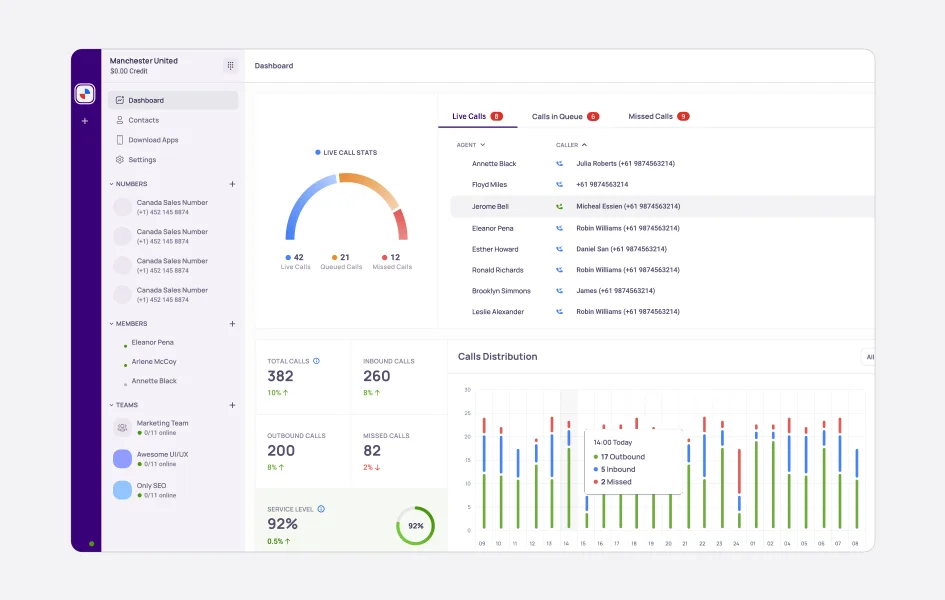
Overall, KrispCall empowers businesses to optimize their call centers by streamlining operations, improving agent productivity, delivering exceptional customer service and utilizing both inbound call center software and outbound call center software.
Wrapping up
Effective call center management is a comprehensive process that demands strategic planning, robust tools, and a customer-centric mindset. Businesses can optimize their call center operations and deliver exceptional customer experiences by implementing proven strategies.
The strategies include prioritizing employee engagement, providing comprehensive training, integrating call center technology with other tools, gathering customer feedback, using call monitoring tools, and developing call center standard operating procedures.
KrispCall provides intelligent call routing, comprehensive analytics, 24/7 support, 99.99% uptime, affordable pricing plans, a cloud-based telephony system, and seamless integration. It helps businesses improve performance, boost customer satisfaction, and succeed in a competitive market.
✋Get a KrispCall call center management solution to improve your customer experience & services. Schedule a free demo to see the difference for yourself!
FAQs
What makes a successful call center?
There are several factors that make a successful call center. Some of the major factors are as follows:
- Effective Staffing and Training
- Quality Monitoring and Feedback
- Customer-Centric Approach
- Well-defined workflows and standardized processes
- Advanced Technology and Tools
What are some primary challenges faced in managing call centers?
Some primary challenges faced in managing call centers are as follows:
- Managing the large number of call volumes.
- Managing high turnover rates.
- Maintaining quality service across all customer interactions.
- Handling customer-sensitive information.
- Managing multichannel support and keeping up with technological advances.
What is the best call center software?
KrispCall is a top choice for call center software due to its excellent 24/7 customer support, seamless integration with popular platforms, user-friendly interface, high-quality audio, cost-effectiveness, and flexibility.
What are the common mistakes in call center management that should be avoided?
The common mistakes in call center management that should be avoided are:
- Neglecting agent training and development.
- Failing to prioritize customer satisfaction.
- Overlooking the importance of data security and compliance.
- Ignoring feedback from both customers and agents.
- Relying solely on metrics without considering qualitative factors.
- Inadequate use of technology to streamline operations.
- Lack of flexibility in adapting to changing customer needs and market trends.
- Not fostering a positive work culture and addressing agent burnout.

